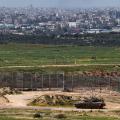The Senate passed a massive, $1.2 trillion bipartisan infrastructure bill in August and now the House needs to vote on it before it goes to President Biden's desk to be signed into law.
It will deliver $550 billion of new federal investments in America's infrastructure over five years, touching everything from bridges and roads to the nation's broadband, water and energy systems. Experts say the money is sorely needed to ensure safe travel, as well as the efficient transport of goods and produce across the country. The nation's infrastructure system earned a C- score from the American Society of Civil Engineers earlier this year.
Democrats claim the bill pays for itself through a multitude of measures and without raising taxes. But the Congressional Budget Office brushed aside several of those pay-for provisions, ultimately finding the bill would add $256 billion to the deficit over the next 10 years. It's significantly smaller than the $2.25 trillion proposal that Biden unveiled in March, known as the American Jobs Plan.
Here's what the bill would fund:
- Funding for Roads and Bridges: The bill calls for investing $110 billion for roads, bridges and major infrastructure projects. That's significantly less than the $159 billion that Biden initially requested in the American Jobs Plan. Included is $40 billion for bridge repair, replacement and rehabilitation, according to the bill text. The White House says it would be the single, largest dedicated bridge investment since the construction of the interstate highway system, which started in the 1950s.
- Money for transit and rail: The package would provide $39 billion to modernize public transit, according to the bill text. That's less than the $85 billion that Biden initially wanted to invest in modernizing transit systems and help them expand to meet rider demand.
- Broadband upgrade: The bill would provide a $65 billion investment in improving the nation's broadband infrastructure, according to the bill text. Biden initially wanted to invest $100 billion in broadband. It also aims to help lower the price households pay for internet service by requiring federal funding recipients to offer a low-cost affordable plan, by creating price transparency and by boosting competition in areas where existing providers aren't providing adequate service. It would also create a permanent federal program to help more low-income households access the internet, according to the White House fact sheet.
- Upgrading airports, ports and waterways: The deal would invest $17 billion in port infrastructure and $25 billion in airports to address repair and maintenance backlogs, reduce congestion and emissions near ports and airports and promote electrification and other low-carbon technologies, according to the White House. It is similar to the funding in Biden's original proposal.
- Electric vehicles: The bill would provide $7.5 billion for zero- and low-emission buses and ferries, aiming to deliver thousands of electric school buses to districts across the country, according to the White House. Another $7.5 billion would go to building a nationwide network of plug-in electric vehicle chargers, according to the bill text.
- Improving power and waterways: The bill would invest $65 billion to rebuild the electric grid, according to the White House. It calls for building thousands of miles of new power lines and expanding renewable energy, the White House said. It would provide $55 billion to upgrade water infrastructure, according to the bill text. It would replace lead service lines and pipes so that communities have access to clean drinking water, the White House said. Another $50 billion would go toward making the system more resilient — protecting it from drought, floods and cyberattacks, the White House said.
- Environmental remediation: The bill would provide $21 billion to clean up Superfund and brownfield sites, reclaim abandoned mine land and cap orphaned gas wells, according to the White House.
Read more about what is in the bill here.




